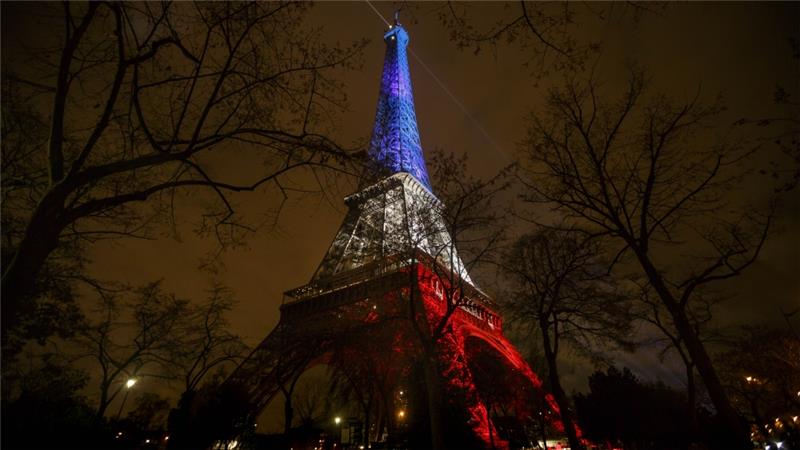Paris, 30 Nov (TWN) — Incoming French President of the Conference of the Parties (COP) to the United Nations climate treaty, Laurent Fabius, assured Parties that the process of reaching an agreement in Paris would be transparent and any text would be a result of engaging with all stakeholders.
“There will be no surprises and I ask the same of you,” said Fabius, during the opening of the Ad Hoc Working Group on the Durban Platform for Enhanced Action (ADP) on 29 November.
The ADP resumed the twelfth part of its second session on 29 November, a day ahead of the official opening of the twenty-first session of the COP (COP21). The ADP will be in session until 5 December and the opening session was used to outline the mode of work for the week. The ADP opened a day ahead of the official opening of the COP given the limited negotiating days available for its work.The ADP is co-chaired by Daniel Reifsnyder (USA) and Ahmed Djoghlaf (Algeria).
The opening of the COP will be marked by a high-level event where 150 heads of states are expected to attend. According to Fabius, the idea behind the heads of state meet is to provide a political impetus and have decisive negotiations to conclude, on 11 December, an ambitious programme for the climate. “The political language expressed will have to be translated into concrete mechanisms,” said Fabius.
Referring to the Durban mandate, Fabius said that Parties had decided to arrive at a legally binding agreement, which meets the needs of climate change and sustainable development before the end of 2015 and the time to realize the Durban mandate had arrived.
He also said that over the two weeks, his priority would be facilitate objectively the attainment of very ambitious agreement among all the countries. He also committed to a transparent process and said that within the rules of the COP, participation of civil society organisations can be ensured. While the first week would be devoted to preparing the agreement, the second week could deal with politically sensitive issues, he added.
Fabius asked of the Parties to give him text as far finalized as possible, with “fewest” options. He said that based on the text agreed to in Bonn and consultations through the year, which shed light on many positions of convergence, he was sure Parties would achieve a good result. He urged Parties to negotiate and compromise and their energy directed at finding solutions. He said that if they took the usual procedure for negotiations and wait for a miracle at the last hour it would not be possible. He also cautioned that the ministers and their representative would have very little time to deal with all the issues.
“If we want a legally binding document and conclude on 11 December, the negotiations on the draft agreement will have to be finalized by mid-week of the second week. We have specific deadlines. We want a universal agreement. We cannot imagine this will happen in a chaotic way,” said Fabius.
On the mode of work for the second week, Fabius said he would propose it end of this week, which would be a “function of your recommendations”.
COP20 President (Peru) Manuel Pulgar Vidal stressed that Parties have to find solutions to the several sections of the text in very few days, both for the agreement and the main decision. “We must find textual solutions for all of them, in an articulated manner, under the guidance of the Co-Chairs and the COP Presidency, with the help of all, including the facilitators. To be effective, we need clear rules of engagement, in particular clear mandates for all consultations, which need to be text-specific, time-bound and solution-oriented, if we want to progress,” he stressed, underscoring the importance of trust.
He said that trust meant inclusiveness, transparency, sense of ownership, Party–driven processes and results. He added that the result should be a balanced, concise and strong draft agreement and decision by the end of the first week.
Outlining the mode of work for the first week, Daniel Reifsnyder (USA) said he along with his co-chair Djoghlaf had convened 33 meeting with groups of Parties and individual Parties. On 28 November, they had convened an informal meeting of the ADP on the mode of work.
Reifsnyder said that the open-ended contact group was established as a central forum to harvest the results of Parties’ collective work. He added that the forum must deliver coherence to their deliberations, in particular on the crosscutting issues, which was a key demand of the Group of 77 and China (see highlights of the G77 statement below).
Reisfsnyder also said that to make the best use of time, they would continue with spin-off groups. Any task to a spin-off would be specific, time bound and with clear expectation of results and the open-ended contact group would ask the spin-off to get clean text as far as possible.
Reifsnyder added that the contact group would start on Tuesday (1 December) at 10 am. The spin-offs would convene on 30 November from 7 pm to 9 pm on technology development and transfer, implementation and compliance, Workstream 2, and on Article 2 and Article 2bis (purpose). The contact group would take up mitigation, adaptation and loss and damage, finance, transparency of action and support, and would hear reports from the spin off groups. It would also consider global stocktake and paragraphs in the decision not related to specific articles in the agreement.
He asked of the Secretariat to prepare individual files with texts of articles based on the 10 November version of the text, and added that the finance section of the 23 October text would be the starting point for finance negotiations. (On 23 October 2015, the last day of the 11th part of the ADP session in Bonn, Parties had agreed on a text, which would serve as the basis of negotiations in Paris.)
On the format of the open-ended contact group, Reifsnyder said that the contact group would meet in a square table format as it is more conducive to an open dialogue, which would help Parties negotiate. It would also be broadcast on the CCTV for maximum participation, he added. Observers would be in an overflow room, he added.
On deadlines, Reifsnyder said that all the spin-off groups would need to complete work by 6 pm on Thursday (3 December) and the negotiations in the contact group would need to conclude at 9 pm on 3 December. A consolidated, revised version would be made available to Parties on Friday (4 December) at 8 am. From 4-5 December, Parties would further develop the draft in the contact group. “The work needs to be finalized by Saturday (5 December), which we will transmit to the COP. The closing plenary of the ADP will be held on Saturday noon,” he said.
Responding to the Co-Chairs on the mode of work, Tuvalu noted the importance of transparency and expressed its disappointment that informal Party-led work had already commenced. “We had very little information about this process. We have the heads of states. We had to quickly adjust to come to this Party-led work. We want assurance that transparency is an important part of the process,” said Tuvalu.
Djoghlaf assured Tuvalu of transparency and said that the informal that Reifsnyder had referred to had taken place at the UNESCO headquarters (in Parice.)and that there had been no surprises. (These pre-sessional consultations with Parties and groups of Parties had occurred on 28 November.) He also added that an ‘informal-informal’ meeting had been organized among the facilitators and the Co-Chairs to prepare for the Paris meeting.
Highlights of G77 and China’s statement
In its statement delivered by South Africa and posted online, the G77 and China reminded that when Parties met in Bonn in October, much time was lost because they started with a text that was very unbalanced. “There is not much time left to conclude our work and we must therefore engage in substantive negotiations. We must be all very conscious of the fact that process will be crucially important for the success of the COP,” the Group said, calling for negotiations to be open and transparent, inclusive and Party-driven.
“To make progress, we suggest that cross-cutting and overarching issues, e.g. purpose, long-term goal, differentiation, progression, ambition and the cross cutting aspects of finance and the legal nature of different obligations across the text, be discussed in the Contact Group. As progress on these cross-cutting issues is essential to unlock the difficulties that are experienced in the Facilitation Groups dealing with mitigation, adaptation, finance, technology transfer, capacity building, and final clauses, these discussions will accelerate the work in the Facilitation Groups. Postponing these important discussions in the Contact Group will not be helpful. We hasten to say that we do not have time for more conceptual discussions and these discussions must be aimed at developing concrete proposals in the Facilitation Groups.”
The G77 and China also said that throughout the ADP process they have reiterated that not only do developing countries face threats to their achievement of sustainable development, but also the very existence and survival of countries, societies and the ecosystems of our Mother Earth. “It is for this reason that developing countries have had no choice but to act against climate change, even in the absence of adequate finance, technology and capacity-building support by developed countries, as clearly demonstrated by the communication of INDCs (intended nationally determined contributions) by the majority of developing countries,” said South Africa.
The Group re-emphasized that the objective of the ADP is to enhance action and to promote the full and effective and sustained implementation of the Convention through the strengthening of the multilateral rules-based regime under the Convention. It is not within the ADP’s mandate to replace, rewrite or reinterpret the Convention, its principles and provisions, in particular the principles of equity and common but differentiated responsibilities, the statement read. “These principles and provisions of the Convention must be reflected in the elements of the agreement.” The Group also urged the developed countries to provide enhanced finance, technology development and transfer and capacity-building support to developing countries for ambitious mitigation and adaptation actions.
Calling for equal balance to be accorded to Workstream 2, the G77 and China said that addressing the pre-2020 ambition gap is vitally important to a successful outcome of the Paris COP and will lay a solid foundation for enhanced mitigation and adaptation action post-2020. “The fact is that commitments by developed countries related to the pre-2020 period still remain unrealised, including the delay in ratifying the Doha Amendment and increasing the emission reduction targets of developed countries to at least 25-40% by 2020.
(The ‘Doha amendment’ refers to the Kyoto Protocol’s second commitment period that required amendments to some provisions of he Protocol.)
There is also, as yet, no clarity on how the commitment of developed countries of providing the US$100 billion per year by 2020 to developing countries will be achieved, nor do we have any predictability on continuation of the provision of finance with clear targets for the post 2020 period,” the statement read. – Third World Network




